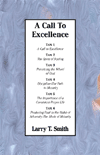















 HOME HOME BIBLE STUDIES BIBLE STUDIES ONLINE MEDIA ONLINE MEDIA BOOKSTORE BOOKSTORE MISSION MISSION CONTACT US CONTACT US LINKS LINKS | PROPER HERMENEUTICS AND THE FOLLY OF THE "TWO CONVERSATION" ARGUMENT - Part 2 Studying Grammar and the Contextual Flow of The Olivet Discourse to Disprove the Doctrine of Dispensationalism Michael F. Blume © 2010 Michael F. Blume All Rights Reserved  The passages in the three gospel accounts of the Olivet Discourse continue as follows: Matthew 24:3 KJV And as he sat upon the mount of Olives, the disciples came unto him privately, saying, Tell us, when shall these things be? and what shall be the sign of thy coming, and of the end of the world?We addressed the first phrase recorded in each gospel account and found them to be one and the same question referring to the same "these things". The rest of the questions asked reveals a variance in wording and terms when all three gospels are compared. Futurists would contend this reveals further evidence of two different conversations in view and not one. The second phrase asks about a SIGN. Matthew 24:3 ...and what shall be the sign of thy coming, and of the end of the world?We used rules of grammar for English literature in the first phrase to learn that the pronoun "these things" pointed back to an antecedent that was stated immediately before the question in which this pronoun is found. That antecedent in all three gospels was Christ's reference to the temple destruction. While Matthew 24 does not mention that same pronoun again after the first question, Mark 13 and Luke 21 both do. Obviously the "these things" mentioned in both Mark and Luke's second question likewise point to the same antecedent that their first question did -- Christ's words about temple destruction. So, we have Mark asking when the temple destruction would occur and what sign would be given for the temple destruction. Luke repeats the same thing. A Dispensationalist saw my point as follows and responded as indicated below: Quote:
Exegesis is allowing the written context to teach and inform us as to what we should believe, without reading anything aside from the writing to influence us. This demands we take what Matthew and Mark wrote before they used the pronoun "these things" and understand that it alone is what "these things" refers to. Since the only thing Matthew and Mark wrote before "these things" is Christ's comment on temple destruction, then this proves futurists' claims to be nonsense about this issue. When Mark and Luke both continue recording questions that use the same pronoun "these things", and nothing else was stated in both accounts after the first question, then we must understand the SIGN for "these things" is likewise speaking of the SIGN when the temple destruction shall occur. This proper exegetical reading of Mark and Luke proves futurism is wrong, as well. Since Matthew 24 mentions the SIGN and does not phrase it the way Mark and Luke did, how do we understand Matthew's words about the SIGN? We already established that all three gospels refer to temple destruction in their questions about "these things". We established that the "sign" of "these things" is the sign of temple destruction. Since nothing else was mentioned in each writer's account of this immediate part of the conversation between the disciples and Jesus, then we can only come to one conclusion. Matthew's reference to the "Sign of thy coming" is speaking about one and the same sign that Luke and Mark wrote about concerning the temple destruction. ANY OTHER CONCLUSION is nonsensical and based upon ridiculous abandonment of all rules of grammar and exegetical analysis of the said writings. Exegesis demands we realize that Matthew and Mark did not intend us to read at the end of Luke's account of this discussion in order to find what SIGN Matthew and Mark wrote about. Therefore, the single SIGN noted in all three accounts refers to one and the same thing... the temple destruction. This informs us that Jesus' "coming" was responsible for the temple destruction. And this is precisely what Jesus, Himself, said. Mat 21:40-41 KJV When the lord therefore of the vineyard cometh, what will he do unto those husbandmen? (41) They say unto him, He will miserably destroy those wicked men, and will let out his vineyard unto other husbandmen, which shall render him the fruits in their seasons.Destruction is noted in the coming of the Lord. Jerusalem is the vineyard! Compare: Mat 21:33 KJV Hear another parable: There was a certain householder, which planted a vineyard, and hedged it round about, and digged a winepress in it, and built a tower, and let it out to husbandmen, and went into a far country:All agree this is referring to Jerusalem with its "tower" of the temple. God's name is a strong tower, and the temple was built to stand as His name. Deu 12:5 KJV But unto the place which the LORD your God shall choose out of all your tribes to put his name there, even unto his habitation shall ye seek, and thither thou shalt come:So, using the same parable Isaiah used, Jesus spoke of Jerusalem and the temple as the vineyard and the tower, and this vineyard was to that which Jesus would come in destruction. To say the SIGN in Matthew and Mark is not the same SIGN Luke spoke about is to demand the antecedents for the disciples' questions' pronouns BE MISSING FROM THOSE RESPECTIVE accounts. That is grammatically ignorant. BACK | NEXT RDTW |
|
© Copyright 2010 Rightly Dividing the Word - All Rights Reserved Please assume that all materials on this website are copyrighted by Rightly Dividing the Word. For permission and details see our terms and conditions. For problems with this website, please contact webmaster1@rightlydividingtheword.com. |






